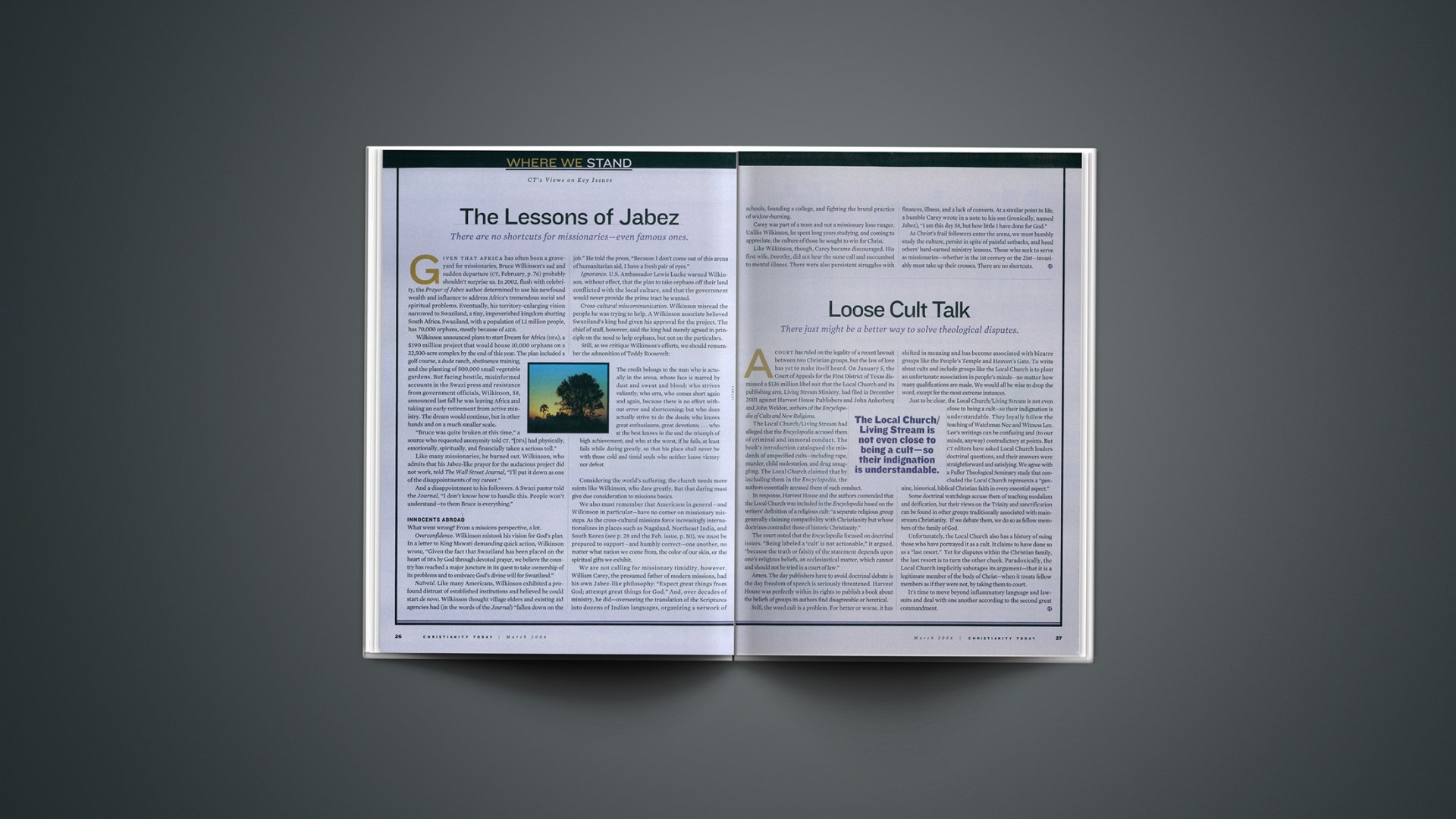Given that Africa has often been a graveyard for missionaries, Bruce Wilkinson’s sad and sudden departure probably shouldn’t surprise us. In 2002, flush with celebrity, the Prayer of Jabez author determined to use his newfound wealth and influence to address Africa’s tremendous social and spiritual problems. Eventually, his territory-enlarging vision narrowed to Swaziland, a tiny, impoverished kingdom abutting South Africa. Swaziland, with a population of 1.1 million people, has 70,000 orphans, mostly because of AIDS.
Wilkinson announced plans to start Dream for Africa (DFA), a $190 million project that would house 10,000 orphans on a 32,500-acre complex by the end of this year. The plan included a golf course, a dude ranch, abstinence training, and the planting of 500,000 small vegetable gardens. But facing hostile, misinformed accounts in the Swazi press and resistance from government officials, Wilkinson, 58, announced last fall he was leaving Africa and taking an early retirement from active ministry. The dream would continue, but in other hands and on a much smaller scale.
“Bruce was quite broken at this time,” a source who requested anonymity told CT. “[DFA] had physically, emotionally, spiritually, and financially taken a serious toll.”
Like many missionaries, he burned out. Wilkinson, who admits that his Jabez-like prayer for the audacious project did not work, told The Wall Street Journal, “I’ll put it down as one of the disappointments of my career.”
And a disappointment to his followers. A Swazi pastor told the Journal, “I don’t know how to handle this. People won’t understand—to them Bruce is everything.”
Innocents Abroad
What went wrong? From a missions perspective, a lot.
Overconfidence. Wilkinson mistook his vision for God’s plan. In a letter to King Mswati demanding quick action, Wilkinson wrote, “Given the fact that Swaziland has been placed on the heart of DFA by God through devoted prayer, we believe the country has reached a major juncture in its quest to take ownership of its problems and to embrace God’s divine will for Swaziland.”
Naïveté. Like many Americans, Wilkinson exhibited a profound distrust of established institutions and believed he could start de novo. Wilkinson thought village elders and existing aid agencies had (in the words of the Journal) “fallen down on the job.” He told the press, “Because I don’t come out of this arena of humanitarian aid, I have a fresh pair of eyes.”
Ignorance. U.S. Ambassador Lewis Lucke warned Wilkinson, without effect, that the plan to take orphans off their land conflicted with the local culture, and that the government would never provide the prime tract he wanted.
Cross-cultural miscommunication. Wilkinson misread the people he was trying to help. A Wilkinson associate believed Swaziland’s king had given his approval for the project. The chief of staff, however, said the king had merely agreed in principle on the need to help orphans, but not on the particulars.
Still, as we critique Wilkinson’s efforts, we should remember the admonition of Teddy Roosevelt:
The credit belongs to the man who is actually in the arena, whose face is marred by dust and sweat and blood; who strives valiantly; who errs, who comes short again and again, because there is no effort without error and shortcoming; but who does actually strive to do the deeds; who knows great enthusiasms, great devotions; … who at the best knows in the end the triumph of high achievement; and who at the worst, if he fails, at least fails while daring greatly, so that his place shall never be with those cold and timid souls who neither know victory nor defeat.
Considering the world’s suffering, the church needs more saints like Wilkinson, who dare greatly. But that daring must give due consideration to missions basics.
We also must remember that Americans in general—and Wilkinson in particular—have no corner on missionary missteps. As the cross-cultural missions force increasingly internationalizes in places such as Nagaland, Northeast India, and South Korea, we must be prepared to support—and humbly correct—one another, no matter what nation we come from, the color of our skin, or the spiritual gifts we exhibit.
We are not calling for missionary timidity, however. William Carey, the presumed father of modern missions, had his own Jabez-like philosophy: “Expect great things from God; attempt great things for God.” And, over decades of ministry, he did—overseeing the translation of the Scriptures into dozens of Indian languages, organizing a network of schools, founding a college, and fighting the brutal practice of widow-burning.
Carey was part of a team and not a missionary lone ranger. Unlike Wilkinson, he spent long years studying, and coming to appreciate, the culture of those he sought to win for Christ.
Like Wilkinson, though, Carey became discouraged. His first wife, Dorothy, did not hear the same call and succumbed to mental illness. There were also persistent struggles with finances, illness, and a lack of converts. At a similar point in life, a humble Carey wrote in a note to his son (ironically, named Jabez), “I am this day 58, but how little I have done for God.”
As Christ’s frail followers enter the arena, we must humbly study the culture, persist in spite of painful setbacks, and heed others’ hard-earned ministry lessons. Those who seek to serve as missionaries—whether in the 1st century or the 21st—invariably must take up their crosses. There are no shortcuts.
Copyright © 2006 Christianity Today. Click for reprint information.
Related Elsewhere:
Previous Christianity Today coverage includes:
Jabez Author Quits Africa | Disappointments prompt early retirement. (Jan. 9, 2006)
Cover Story
Mr. Jabez Goes to Africa | Bruce Wilkinson expands his borders to include racial reconciliation and HIV/AIDS. (Oct. 17, 2003)
Never-Ending Gardens | Bruce Wilkinson and his son teach the hungry to feed themselves. (Oct. 17, 2003)
The Wall Street Journal report on Wilkinson is available online for subscribers.
CT’s managing editor, Mark Galli, reviewed Wilkinson’s The Prayer of Jabez and The Secrets of the Vine.
More on ministry in Africa and Missions is available from our World Report.










